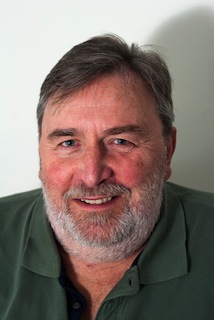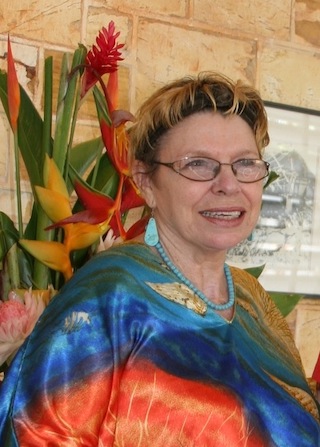 World-famous birdwatcher, Bo Beolens, aka the Fat Birder, will call for more accessible nature reserves when he presents via podcast at a Darwin workshop that aims to improve wildlife tourism in the NT.
World-famous birdwatcher, Bo Beolens, aka the Fat Birder, will call for more accessible nature reserves when he presents via podcast at a Darwin workshop that aims to improve wildlife tourism in the NT.
The British birder is renowned for championing the challenges faced by disabled birdwatchers and others who try to find a suitable birding tour or access a nature reserve.
Mr. Beolens, who suffers from Ankylosing Spondylitis, a crippling arthritis of the spine, said nature reserves and birding trips offered few concessions to the average person, let alone those with restrictions on their mobility. “It occurred to me this is because the majority of (those in the business) are six-feet tall, fit and able young men,” he said.
“I always liken such provision to the shoe trade. If the only shoes made were size 10 all-weather boots, those wanting size five pink stilettos would be sadly disappointed. Most of us are not fit and able six-footers, so viewing slots need to be at variable heights; not everyone can walk a mile non-stop so we, just like the birds need a perch every 150 yards or so.
“I wanted nature to be more accessible. I wanted the designers to go back to the drawing board and make sure that the provisions they make for human access more friendly to all.”
Organised by Wildlife Tourism Australia and to be opened by NT Administrator the Honourable Sally Thomas AM, the October 2-4 workshop will examine the problems, potential and possibilities of connecting wildlife and visitors in the Top End.
Wildlife Tourism Australia Vice Chair Denise Lawungkurr Goodfellow said many visitors to the Top End wanted a more in-depth wildlife experience. “Women, who dominate the huge US birdwatching market, want to experience more than just new birds,” she said.
“Rather than fixating on ‘twitchers’, a small market dominated by men, this workshop will investigate how Australia’s wildlife tourism industry can deliver a more in-depth experience by involving true experts, from the senior citizen who’s an authority on native orchids to the grazier or Indigenous family living on their country.”
As well as Bo Beolens and Denise Goodfellow, speakers will include wildlife experts and academics from Australia, Asia, Europe and the US. Among them, are Associate Professors Junko Oshima from Okinawa, and David Newsome, author of several books on wildlife tourism, and Dr. David Croft, an authority on kangaroos.
Exciting field trips before and after the three-day workshop will include birdwatching, other wildlife viewing and Indigenous guiding. Topics at the Wildlife Tourism workshop will include:
- Eastern and western approaches to avitourism (bird tourism),
- Comparisons between twitching and true birdwatching
- How to accommodate the disabled traveller and
Indigenous approaches to wildlife interpretation and difficulties they may face; from jumping financial/bureaucratic hurdles and the topical issue of tourism activities in conservation areas, to loving your (native) cockroach or snake.
The workshop will take place in Darwin from October 2-4, 2013: More details can be found at http://wildlifetourism.org.au/blog/workshop-2013
For more information:
Ronda Green, Chair, Wildlife Tourism Australia,
Email platypuscorner@bigpond.com or phone 07 5544 1283
Denise Goodfellow, Vice-chair, Wildlife Tourism Australia
Email goodfellow@bigpond.com.au or phone 0438 650 835
For media assistance, call John Harris on 08 8431 4000 or email john@impress.com.au.
Related News
- Wildlife Tourism the topic of Top End workshop What do tourists value when they visit Australia’s Top End? Are they into shock and awe? In other words do they care as much as the tourism industry about what Australi...
- Gamba grass: Controlling the nightmare Gamba grass (Andropogon gayanus) is a tall (4 metres high), multi-stemmed plant introduced to Australia in the 1930s as cattle fodder (Csurhes, 2005). The potential dan...
- Birds of Australia's Top End 2020 calendar raises money to fight gamba grass fuelled bushfires A calendar depicting Australian birds from which are endangered by increasingly ferocious bushfires is helping to raise funds to support a volunteer brigade which battles these bla...
- New bird book from ‘ratbag of the north’ Variously described as an “NT Treasure” and a “ratbag of the north”, eco-tour guide, passionate birder and former buffalo hunter Denise Lawungkurr Goodfellow has published a new bo...






